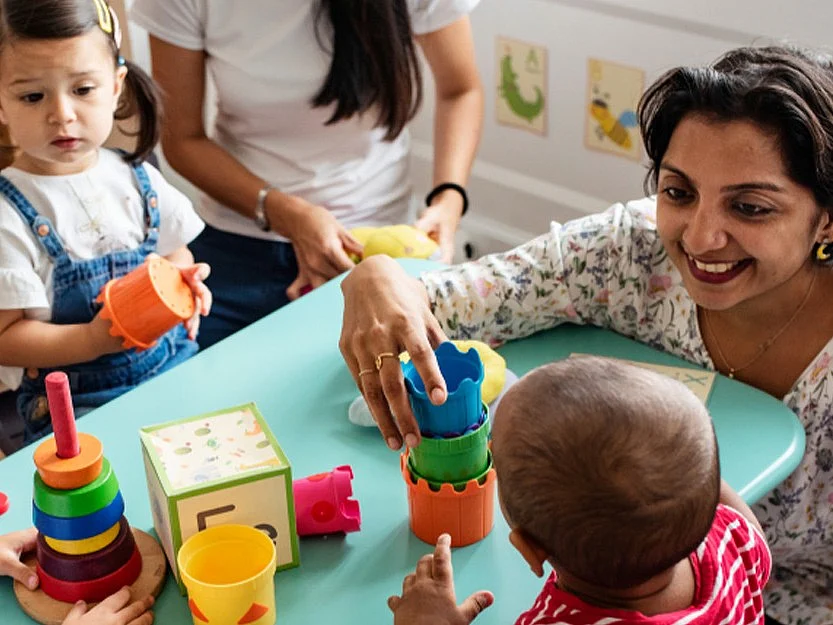Abu Dhabi nurseries boost math and language skills by 70%, strengthen national identity
Findings based survey to assess the impact of nurseries on early childhood development

The Abu Dhabi Department of Education and Knowledge (ADEK) has confirmed that children enrolled in early education programs demonstrate up to a 70% improvement in language and math skills. In addition, these programs enhance children’s social abilities and strengthen national identity among Emirati students from an early age, while also improving their Arabic language learning.
These findings are based on the results of a survey conducted by ADEK to assess the impact of nurseries on early childhood development, with the aim of enhancing early education programs. The survey addressed six key questions, including the significance of nursery education in early developmental stages, primary reasons for enrolling or not enrolling a child in nursery, whether concerns about quality of care or high fees play a role, the importance of nurseries in developing children’s social communication skills, the role of health, happiness, and psychological well-being programs in overall development, and the necessary advancements nurseries should undergo.
27,791 children enrolled in 225 nurseries in Abu Dhabi
The department emphasized that the early years of a child’s life are critical for positive brain development and the acquisition of cognitive, emotional, and social skills, as well as lifelong health. It reaffirmed every child’s right to developmental opportunities and reiterated its commitment to enhancing the quality of early education services.
Currently, there are 225 private nurseries in Abu Dhabi, offering a total of 27,791 seats. Nurseries play a vital role in driving economic growth by creating employment opportunities for Emirati professionals in education and enabling parents to focus on their careers.
Under the new policies on early education enrollment and employment—effective from the next academic year—all institutions will be required to operate with fairness, transparency, and non-discrimination. Children may only be denied enrollment if capacity limits have been reached. Early education centers must also employ staff across seven essential roles: director, inclusive education coordinator, early childhood teacher, assistant, health officer, hygiene officer, and security staff. Only women may be employed within nurseries, and staff must complete 25 hours of professional training.
Nursery fees
Nursery fee structures show that annual tuition ranges from AED 17,750 to AED 51,375, depending on the nursery type and available facilities. The department has adopted a precise mechanism to assess various factors before approving tuition fees, ensuring the process is logical and transparent. These factors include operational costs (such as rent), staffing expenses to maintain proper student-to-teacher ratios, investment in educational materials, and safety measures.
Fees are also evaluated based on market trends and service sustainability, ensuring that fees are aligned with the goal of providing children with a safe and enriching developmental experience.
The role of nurseries in enhancing child development
Studies and research show that nurseries significantly improve children’s overall performance by providing an early educational and social environment, developing essential skills, and promoting holistic growth.
Key benefits include:
Social and emotional development: Nurseries offer interactive environments that help children build social skills, self-confidence, and cooperation.
Cognitive and language development: Through structured learning and play, nurseries foster critical thinking, problem-solving abilities, and language acquisition.
School readiness: Nurseries prepare children for formal schooling by introducing them to routines, discipline, and group learning.
Value and ethics education: Through stories and educational games, nurseries instill positive values and behaviors, guided by role models such as teachers and caregivers.
Motor skills development: Physical activities and free play help develop children’s motor skills and support physical health and growth.
Support for working mothers: Nurseries offer a safe, nurturing environment for children, enabling mothers to continue their professional careers while ensuring peace of mind.
“Tomorrow’s nurseries” initiative
Under the supervision and guidance of ADEK, Abu Dhabi is currently home to over 200 private nurseries offering more than four specialized curricula tailored to children aged 0 to 4 years.
The “Tomorrow’s Nurseries” initiative specifically targets Emirati children aged 3 months to 4 years, aiming to increase access to high-quality early education services and pave the way for a brighter and more prosperous future for students.
ADEK plans to expand this initiative by opening 10 new nurseries by the end of 2024 to meet growing demand for early education across the emirate.
These nurseries offer free childcare services and ensure a safe and healthy environment, enabling parents to pursue their careers with confidence, knowing their children are well cared for. The programs are designed to promote Arabic language, values, and cultural heritage, which are essential for preserving national identity, reflecting ADEK’s commitment to fostering cultural awareness from an early age.
In addition to instilling local values, these nurseries also adopt international standards and curricula, ensuring children receive a comprehensive and high-quality education.
Sign up for the Daily Briefing
Get the latest news and updates straight to your inbox
Network Links
GN StoreDownload our app
© Al Nisr Publishing LLC 2026. All rights reserved.